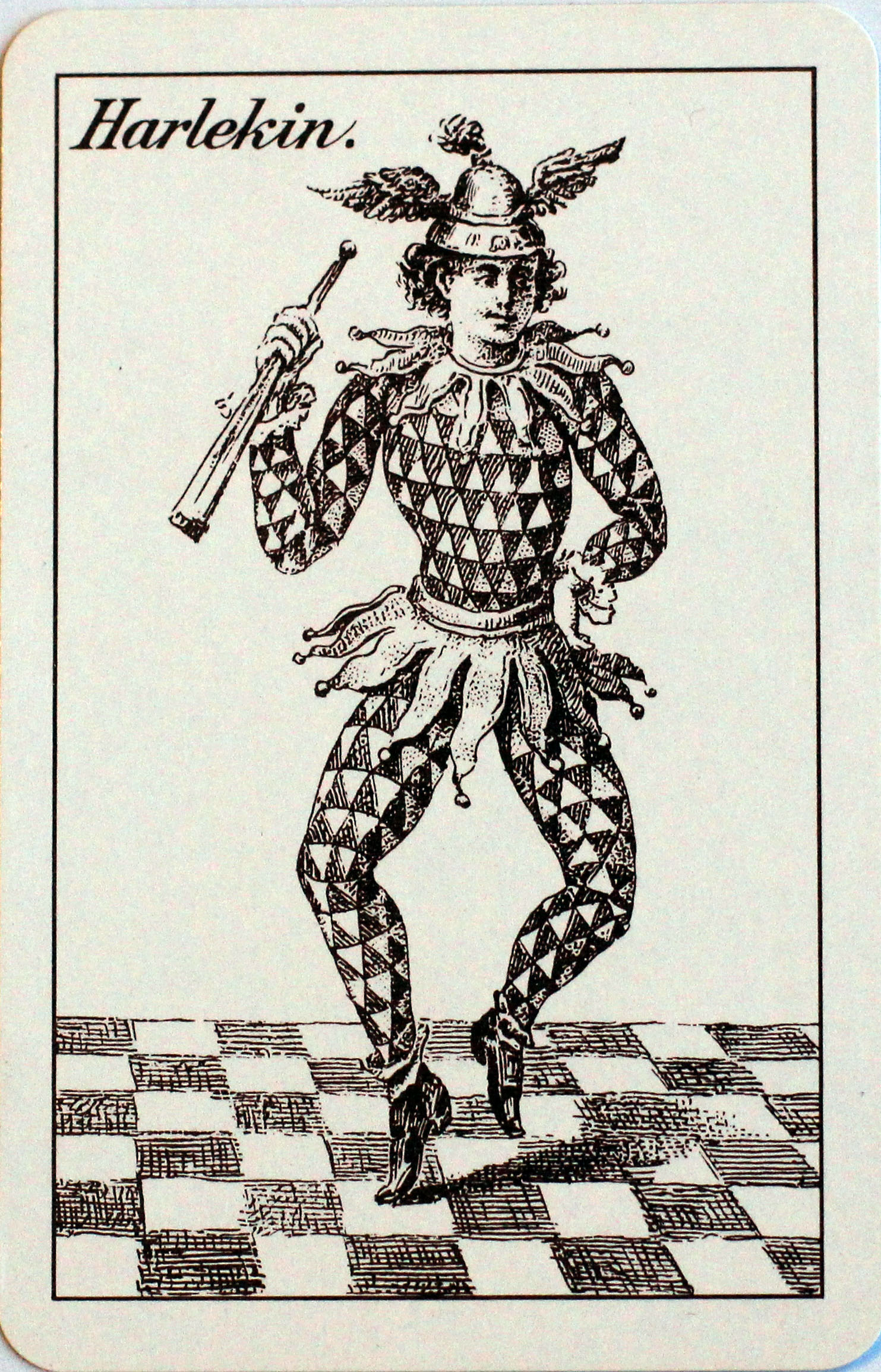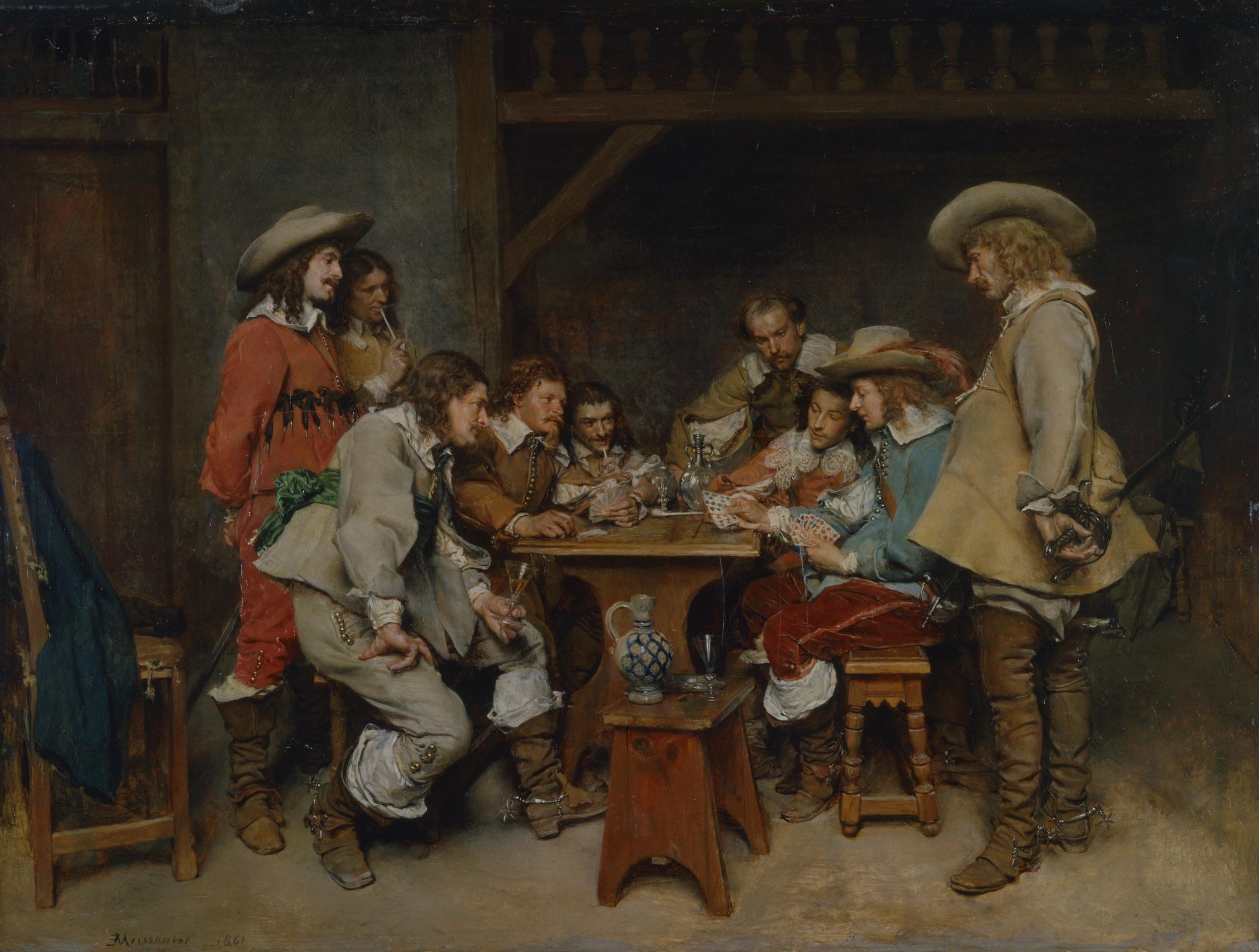|
Coucou
Coucou ("Cuckoo") is an historical French card game that uses a pack of 32 or 52 cards and is played by five to twenty players. It is unusual for being played with only a single card in hand. As a shedding game, there is only one winner who may claim the stakes, if there are any. The game has also been called As Qui Court or Hère. History The earliest references to the game date to the early 16th century in France where it was known by the name of Mécontent (also ''Méscontent'', ''Maucontent'' or ''Malcontent'') and was played with a standard 52-card deck. The first rules appear under the name Hère in 1690Furetière (1690). and as Coucou in 1721. The name As Qui Court appears in the mid-19th century, but the name Coucou ("cuckoo") persisted and the game is still played in France today under that name. The game migrated to England by 1881 as Ranter-Go-Round, but is now also sometimes known as Cuckoo. Cards The game uses a regular 52-card pack, or a smaller 32-card deck ... [...More Info...] [...Related Items...] OR: [Wikipedia] [Google] [Baidu] |
Ranter-Go-Round
Ranter Go Round is a primitive, traditional, English gambling game and children's game using playing cards that also nowadays goes under the name of Chase the Ace. In America it is usually recorded in the literature as Ranter Go Round (rarely is it hyphenated), but is also sometimes called Screw Your Neighbor which, however, is an alternative name used for at least four other quite different card games. A similar game is known in most European countries as Cuckoo; it originated in 16th-century France and developed into the French game of Coucou. Ranter Go Round is related to the dedicated pack card or tile games of Gnav and Killekort. History Ranter Go Round is described as early as 1881. The game "is said to have been first played in Cornwall,"''Cassell's Book of Sports and Pastimes'' (1882), pp. 869–870. although its rules are almost identical to French Coucou ("Cuckoo") which itself goes back to the 15th century and there are other European games of the same family pl ... [...More Info...] [...Related Items...] OR: [Wikipedia] [Google] [Baidu] |
Card Game
A card game is any game that uses playing cards as the primary device with which the game is played, whether the cards are of a traditional design or specifically created for the game (proprietary). Countless card games exist, including families of related games (such as poker). A small number of card games played with traditional decks have formally standardized rules with international tournaments being held, but most are folk games whose rules may vary by region, culture, location or from circle (cards), circle to circle. Traditional card games are played with a ''deck'' or ''pack'' of playing cards which are identical in size and shape. Each card has two sides, the ''face'' and the ''back''. Normally the backs of the cards are indistinguishable. The faces of the cards may all be unique, or there can be duplicates. The composition of a deck is known to each player. In some cases several decks are Shuffling, shuffled together to form a single ''pack'' or ''shoe''. Modern car ... [...More Info...] [...Related Items...] OR: [Wikipedia] [Google] [Baidu] |
Kille (card Game)
Kille (pronounced or ), also called Harlequin, Cambio, Campio, Kambio or Kamfio, is a game played with special playing cards, dating from a medieval French gambling game. In Sweden, the game had its heyday during the 1750s, but it is one of the oldest card games still played.Insert sheet in Killelek from Offason. ''Regler för Killespelet – Historik''. Dan Glimne. History The French gambling game of Coucou was invented in France around 1500 and spread across Central Europe. In the late 17th century, an Italian manufacturer produced a deck of cards adapted for the game. The game was named Cuccú after its highest card. Cuccú had 38 cards and two cards of each denomination (thus 19 unique denominations). Eleven of the cards in each suite were numeral cards, numbered 0-10. The other cards were picture cards, two of which – the Bucket and the Masque – ranked lower than the numerals. Five of the cards were ranked higher: the Inn, Cat, Horse, Guard, and Cuckoo (highest). The nin ... [...More Info...] [...Related Items...] OR: [Wikipedia] [Google] [Baidu] |
Piquet
Piquet (; ) is an early 16th-century plain-trick card game for two players that became France's national game. David Parlett calls it a "classic game of relatively great antiquity... still one of the most skill-rewarding card games for two" but one which is now only played by "aficionados and connoisseurs." Historically also known as Sant or Saunt from the French ''Cent''. History Piquet is one of the oldest card games still being played. It is first mentioned, as ''Le Cent'', in a written reference dating to 1535, in ''Gargantua and Pantagruel'' by Rabelais. Although legend attributes the game's creation to Stephen de Vignolles, also known as La Hire, a knight in the service of Charles VII during the Hundred Years' War, it may possibly have come into France from Spain because the words "''pique''" and "''repique''", the main features of the game, are of Spanish origin. The earliest clear mention of the game – leaving aside various predecessors – is in 1585 by Jacques Perr ... [...More Info...] [...Related Items...] OR: [Wikipedia] [Google] [Baidu] |
Round Games
Round or rounds may refer to: Mathematics and science * Having no sharp corners, as an ellipse, circle, or sphere * Rounding, reducing the number of significant figures in a number * Round number, ending with one or more zeroes * Round (cryptography) * Roundness (geology) * Roundedness, when pronouncing vowels * Labialization, when pronouncing consonants Music * Round (music), a type of composition * ''Rounds'' (album), by Four Tet Places * The Round, a theatre in England * Round Point, in the South Shetland Islands * Rounds Mountain, in the US * Round Mountain (other), several places * Round Valley (other), several places Repeated activities * Round (boxing) * Round (dominoes) * Grand rounds, in medicine * Round of drinks * Funding round * Doing the rounds, or patrol Other uses * Round (surname) * Rounds (surname) * Round shot * Cartridge (firearms) * Round steak * Cattle * Bullion coins that are not legal tender, e.g. silver rounds * Rounds (webs ... [...More Info...] [...Related Items...] OR: [Wikipedia] [Google] [Baidu] |
French Deck Card Games
French may refer to: * Something of, from, or related to France ** French language, which originated in France ** French people, a nation and ethnic group ** French cuisine, cooking traditions and practices Arts and media * The French (band), a British rock band * "French" (episode), a live-action episode of ''The Super Mario Bros. Super Show!'' * ''Française'' (film), a 2008 film * French Stewart (born 1964), American actor Other uses * French (surname), a surname (including a list of people with the name) * French (tunic), a type of military jacket or tunic * French's, an American brand of mustard condiment * French (catheter scale), a unit of measurement * French Defence, a chess opening * French kiss, a type of kiss See also * France (other) * Franch, a surname * French Revolution (other) * French River (other), several rivers and other places * Frenching (other) Frenching may refer to: * Frenching (automobile), recessing or mou ... [...More Info...] [...Related Items...] OR: [Wikipedia] [Google] [Baidu] |
French Card Games
French may refer to: * Something of, from, or related to France ** French language, which originated in France ** French people, a nation and ethnic group ** French cuisine, cooking traditions and practices Arts and media * The French (band), a British rock band * "French" (episode), a live-action episode of ''The Super Mario Bros. Super Show!'' * ''Française'' (film), a 2008 film * French Stewart (born 1964), American actor Other uses * French (surname), a surname (including a list of people with the name) * French (tunic), a type of military jacket or tunic * French's, an American brand of mustard condiment * French (catheter scale), a unit of measurement * French Defence, a chess opening * French kiss, a type of kiss See also * France (other) * Franch, a surname * French Revolution (other) * French River (other), several rivers and other places * Frenching (other) Frenching may refer to: * Frenching (automobile), recessing or moul ... [...More Info...] [...Related Items...] OR: [Wikipedia] [Google] [Baidu] |
Joseph Méry
Joseph Méry (21 January 179717 June 1866) was a French writer, journalist, novelist, poet, playwright and librettist. Career An ardent romanticist, he collaborated with Auguste Barthélemy in many of his satires and wrote a great number of stories, now forgotten. Nowadays he is perhaps best remembered as the co-librettist of the original version in French of Verdi's ''Don Carlos,'' which premiered in Paris in March 1867. Also, he was the author of the play ''La Bataille de Toulouse'' which Verdi had earlier adapted for his opera '' La battaglia di Legnano'' in January 1849. He was noted in his time for his wit and ability to improvise. He produced several pieces at the Paris theatres, and also collaborated with Gérard de Nerval in adaptations from Shakespeare and in other plays. A friend of Offenbach, he wrote libretti for three of the composer's works. His novella ''Histoire de ce qui n'est pas arrivé'' (1854) is a significant exercise in alternate history, in which M ... [...More Info...] [...Related Items...] OR: [Wikipedia] [Google] [Baidu] |
Jacques Lacombe (writer)
Jacques Lacombe (1724–1811) was a French bookseller and lawyer. His notable works include ''Encyclopediana ou Dictionnaire encyclopédique des ana'' (1791), one of the volumes of the ''Encyclopédie Méthodique The ''Encyclopédie méthodique par ordre des matières'' () was published between 1782 and 1832 by the France, French publisher Charles Joseph Panckoucke, his son-in-law Henri Agasse, and the latter's wife, Thérèse-Charlotte Agasse. Arranged by ...''. Another was ''Abrégé chronologique de l'histoire ancienne des empires et des républiques qui ont paru avant Jésus-Christ. Avec la notice des savans et illustres, & des remarques historiques sur le génie & les mœurs de ces anciens peuples.'' (1757). Most of his works were compilations. References Further reading * Karl-Heinz Kuhn: ''Das französischsprachige Pressewesen im Herzogtum Pfalz-Zweibrücken'' (Trier, Univ., Diss., 1990; Reprint 2006). 1724 births 1811 deaths French librarians 18th-century French ... [...More Info...] [...Related Items...] OR: [Wikipedia] [Google] [Baidu] |
Gioachino Greco
Gioachino Greco ( – ), surnamed Cusentino and more frequently ''il Calabrese'', was an Italian chess player and writer. He recorded some of the earliest chess games known in their entirety. His games, which never indicated players, were quite possibly constructs, but served as examples of brilliant combinations. Greco was very likely the strongest player of his time, having played (and defeated) the best players of Rome, Paris, London, and Madrid. Greco's writing was in the form of manuscripts for his patrons, in which he outlined the rules of chess, gave playing advice, and presented instructive games. These manuscripts were later published to a wide audience and became massively influential after his death. Name The name "Greco" is often assumed to be indicative of a Greek heritage. Indeed, Calabria, the region in which Greco was born, has a long history of Greek immigration and use of Greek as the vernacular. One prominent writer, Willard Fiske, even suggests (in ... [...More Info...] [...Related Items...] OR: [Wikipedia] [Google] [Baidu] |



